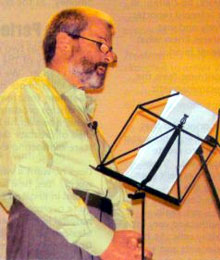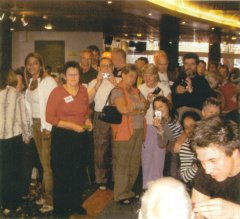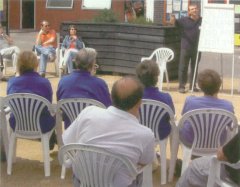Originally published in August 2003 icon

By Chris Woollams
As I pulled into the Manchester University car park more than a little hot under the collar thanks to the RAC satellite directions taking me off the motorway at completely the wrong junction, the first thing I saw was a huge queue outside the front door. Just what I needed.
On closer examination, this was no queue. Just twenty to thirty delegates standing outside, having a fag!>
Professor Julian Peto (Epidemiology expert) talked about risk factors for cancer on the first day. Most of these were more than ignored on the evenings in the bar! This was hardly what I expected at a cancer conference. Talk about setting an example!
So what was this conference all about? I can sum it up in one word: CARE.
The people who attend are so caring and happy. They get first-class honours degrees in being lovely. They laugh a lot and on the disco floor they would have shamed the normal Manchester University student clientele. Given that the majority of delegates were female and over 50 years of age - one or two were in their 80’s -this was a real experience. Energy oozed out everywhere. Again, hardly what I had expected.

They have little money, few grants, no resources but their camaraderie and determination know no bounds

Delegates come from several sources. The majority were from the Midlands, Wales, and the North of England; a singleton or a handful from a locally-organised support group which might have been for cancer in general or specific to one type, for example, breast cancer. Other delegates had set up care units. Mary from Swansea had started out ten years ago simply to help a few people suffering from cancer in her local area. Now she meets and comforts over 9,000 cancer patients a year.
These people know cancer first hand. They have little money, few grants, no resources but their camaraderie and determination know no bounds. This conference is clearly very special to them. They are recharged; and they recharge others. "It is a very enjoyable learning experience, full of emotional support", said one lady to me. Her group in Loughborough, although short of funds, has a full library, a nutritionist, a doctor, two healers and a variety of other therapists. In all, the group can vary from 50 to 140 people depending upon cancer type. The NHS should be listening to these people.
Peter Cardy, Head of Macmillan, was in no doubt about this: the patients, their carers and supporters with first-hand experience of cancer should be using their experience, knowledge and wisdom to blaze a trail. Patients in other "disease categories" have come up with many excellent treatment ideas and influenced how doctors give treatments. The same should be true of cancer. He mentioned Macmillan as a catalyst for this, supporting the care groups and the independent group "cancer voices". Indeed Macmillan does not want to claim they themselves speak for cancer patients and are sponsoring a national "listening" exercise, to elicit patient’s views and put them first.
And, he stressed, in the future good patient ideas will be needed more than ever. As populations age and, he argues, cancer treatments improve, cancer will be seen less and less as a short-term chronic attack and more a long-term problem to be lived with. Many types of cancer will be treated at home, many people will have several illnesses at once (e.g. diabetes and cancer; cancer and heart problems, cancer and Alzheimer’s), and simultaneously the doctors, nurses and carers will be part of the ageing population, so their "care" levels will be in short supply.
He argued that this made the need for clever ideas from patients and supporters even more critical and the responsibility will move to even more self-help.

There are between 700 and 800 self-help and support groups who have registered with Macmillan. If the future of cancer care is to be in their hands then funding needs to be urgently diverted their way. And why not? Professor Julian Peto was actually quite scathing about how pharmaceutical companies with all their funds were "getting in the way of good research, by demanding (even if they are funding) more trials for yet more drugs". His other point was that ultimately who is paying for this? You and I. Taxpayers pay for drugs and fund the pharmaceutical companies’ profits. Hence they fund, albeit indirectly, the research, so the pharmaceutical companies should have less say, the balance should be readdressed.
And here is something I certainly had not thought about before, but is quite obvious really. The pyramid of richesse in cancer care. The scientists and doctors, "the few", well-funded and working on the future of orthodox medicine, whilst "the many toil with little resource at the sharp end.
The imbalance seems all too evident with a real lack of funds provided to people who are simply helping the cancer patients play a full part in society over a long period after their relatively short experience with the medical profession.
Having seen the care, the enthusiasm and sheer energy that flooded out of these 400 delegates, I know where I’d put my money if I were thinking of the future of the Health Services. Interestingly, Peter Cardy echoed what we are trying to do with our charity Cancer Active. We want "activists" who can lobby local MPs and so on, when issues like fluoride in water become silly.
He too is equally clear. Cancer hits 2 per cent of the population at any one time, and if the diagnosis is bad for the patient, often it is far worse for the people who love that person.
"This huge group of people need to remind politicians that people with cancer are voters and act forcefully at the local level", he said.
And he’s right. How many MPs could take a vote swing against them of, say, 2 per cent, from the cancer patients and their families and friends?
If the Government wants to rely increasingly on these wonderful local supporters and cancer carers, let them put their money where their mouth is.
Anyone who is diagnosed would do well to seek out their local support group early on, not just for the informal book library they might have, or the wealth of latest information.

These groups are a gold mine of first hand experience; most members have been in the deep end of the cancer pool at some stage themselves. They can give you useful help and advice on every aspect of your cancer - been there, got the T-shirt.
And they are so very helpful, not pushy or condescending, just offering balanced honesty and reasonableness at whatever speed you want to go.
People are encouraged to talk, to share their own experience, but not in a formal embarrassing way. Just in a normal chatty sort of way. "It’s one of the best therapies, you know Sometimes it really helps to get things off your chest; you feel better instantly", said one of the delegates to me.
I was so impressed.
My only negative observation was the excess weight carried by a great many of the delegates. I know it’s naughty to mention it but I worked out across 100 delegates sitting in my vicinity, 78% were clearly overweight with, dare I say it, about 50% obese. Now, being overweight is the biggest risk factor in cancer so it did seem as if a major issue was not getting through to the support group team leaders.
And of course that could put a serious doubt in the minds of some potential support group recruits. Equally, amidst the umpteen break-out sessions I could have understood the importance of the Spirit and Mind in the healing process to honours degree level; but where was even one breakout session on the Body and the importance of a good diet and healing nutrition programme? Perhaps a little something on the use of vitamins? It would be churlish of me to suggest holding such a session over breakfast - I thought the bacon, eggs and sausage with extra grease went out years ago! Having said all that, they did ask me to come back next year and speak on the subject! So they must have taken the hint.
If you know someone who would benefit from contacting their local Self Help or Support group, and that basically means anyone and everyone who is living with cancer, a good place to start is a telephone call to Macmillan: (020 7840 7841).
Alternatively you can ring 020 8656 7520 or email on nccshg@aol.com.